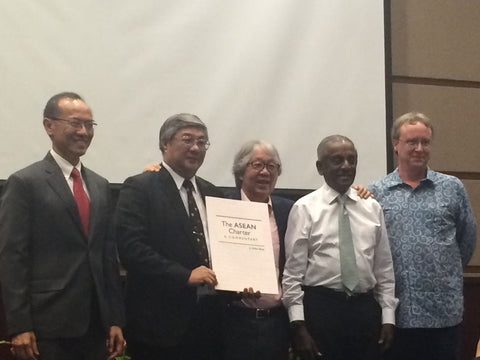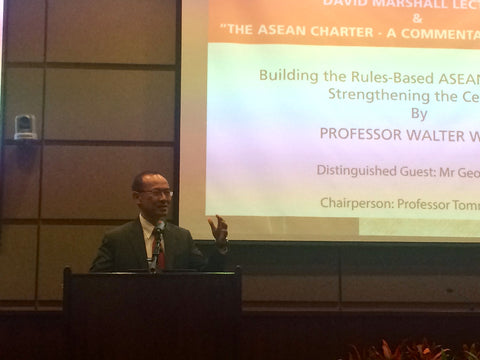Book Launch of Walter Woon’s The ASEAN Charter: A Commentary November 19, 2015 14:31

from left: Former Foreign Affairs Minister George Yeo, Professor Walter Woon, Professor Tommy Koh, former Senior Minister S. Jayakumar, and NUS Press Director Peter Schoppert.
Professor Walter Woon’s The ASEAN Charter: A Commentary was launched on 13 November 2015 at the NUS Faculty of Law.
The ASEAN Charter comments on the provisions of the 2008 Association of Southeast Asian Nations (ASEAN) Charter, which established ASEAN’s legal status and institutional framework. Professor Woon, a Member of the High Level Task Force that drafted the Charter and Singapore’s former Attorney-General, crafts an insider’s perspective on the making of the Charter, elucidates how its provisions came to be drafted, and how they relate to diplomatic practice. As both former Foreign Affairs Minister George Yeo and Singapore’s Ambassador-at-Large Professor Tommy Koh eulogised during the launch, The ASEAN Charter is a very important and useful reference text for ASEAN officials and scholars, as well as members of the public who are interested in the organisation.
George Yeo on the “magic of ASEAN”

Graced by the likes of former Senior Minister S. Jayakumar as well as numerous members of the legal community, the launch of The ASEAN Charter commenced with a few words from George Yeo in praise of ASEAN. Highlighting Myanmar's National League for Democracy’s latest victory at the polls, Yeo attested that this outcome was in part a “triumph of ASEAN”. Indeed, such is the “magic of ASEAN”—a space that allows room for disagreement, evolution, and provides time for the branch to gradually bend, Yeo affirmed. Continuing in this positive vein, Yeo concluded that that despite criticisms, ASEAN has not only kept the peace in the region, but is also a historical necessity that will hold together with time.
ASEAN: Rolls-Royce ambition, Volkswagen model

Less sanguine about ASEAN was Professor Woon in his professorial lecture on the imperative to build a rules-based ASEAN community and strengthen the association’s centre.
Professor Woon stressed that ASEAN is “in essence not a legal institution”, having begun its life as a confidence-building mechanism for bickering countries and continued with an “ASEAN way” of being ad hoc. Accordingly, the formal rules that the ASEAN Charter intends to set in place do not sit well with ASEAN practice. Seen from this perspective then, ASEAN appears to have the “ambition to create a Rolls-Royce organisation, but fit[s] it with a Volkswagen model with dodgy software”. Professor Woon ultimately compared the Charter to a camel, being serviceable but inelegant.
What could upgrade ASEAN to become a full-fledged Rolls-Royce vehicle then? Professor Woon flagged a few areas that could be improved. Firstly, a proper legal service with international lawyers was needed to establish a rule-making centre that would also ensure the coherence of and compliance with such rules. Another aspect that a rules-based organisation requires is a proper dispute settlement system, with ASEAN’s current system being designed to be ineffective, Professor Woon lamented. The fact that the ASEAN High Council has never been convened was cited as evidence of such ineffectiveness. Moreover, the bringing of disputes to political settings like the ASEAN Summit—as has been done—is fatal to ASEAN’s credibility as a rules-based organisation. Ending on a more ambiguous note, Professor Woon pondered the possibility of being able to celebrate this rules-based element in time with ASEAN’s jubilee year in 2016.
A camel on shifting sands: Tommy Koh on ASEAN

Professor Tommy Koh was able to draw the book launch to a more buoyant close. Picking up on Professor Woon’s earlier camel metaphor for the ASEAN Charter, Professor Koh defended the association by extolling the importance of the animal to the audience’s amusement. To be sure, the camel might lack elegance, but in Professor Koh’s words, the anatomy of its hoofs, for instance, allows it to walk across shifting sands—likewise then for ASEAN, in its ambitions and efforts over the years.
The ASEAN Charter: A Commentary is now available at NUS Press.
